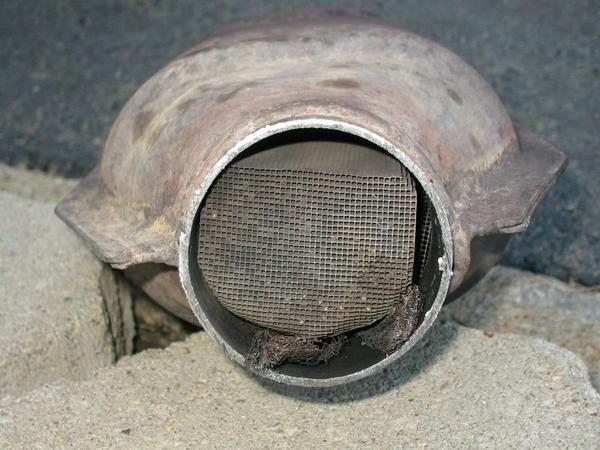Last Updated on February 10, 2023 by Ryan
If your catalytic converter is rattling, it may be due to a loose heat shield or broken baffle. To quiet a rattling catalytic converter, first check for loose heat shields or broken baffles and tighten or replace them as needed. If the heat shield and baffles are in good condition, the rattling may be due to a build-up of carbon deposits on the inside of the converter.
To clean the carbon deposits, remove the converter and soak it in a solution of water and vinegar for 24 hours. After soaking, scrub the inside of the converter with a brush to remove any remaining carbon deposits.
- Find the source of the rattling noise
- The catalytic converter is located under the car between the engine and the muffler
- Once you have located the converter, gently tap on it with a tool to see if the noise changes
- If it does, then the converter is loose and needs to be tightened
- Use a wrench or socket to loosen the bolts that hold the converter in place
- Tighten the bolts until they are snug, but be careful not to over-tighten them as this could damage the converter
Rattling Catalytic Converter
How Do You Stop a Catalytic Converter from Rattling?
A catalytic converter is designed to reduce harmful emissions from a vehicle’s exhaust system. However, over time the elements inside the converter can break down, leading to a rattling noise. While this noise is usually not harmful to the vehicle, it can be quite annoying.
Fortunately, there are a few things you can do to stop the rattling and restore your converter to its quiet operation.
First, check to see if the rattling is coming from within the converter itself or from somewhere else in the exhaust system. If it is coming from within the converter, then it is likely that the metal honeycomb inside has broken down and is now loose.
This can happen with age or if the converter was exposed to excessive heat (such as from operating the vehicle without a proper exhaust system). To fix this problem, you will need to replace the catalytic converter.
If the rattling noise is coming from elsewhere in the exhaust system, then there are several potential causes.
One possibility is that a heat shield or other component has come loose and is now vibrating against something else in the system. Another possibility is that your muffler has developed a hole or crack which is causing an exhaust leak. In either case, you will need to have your exhaust system inspected by a professional mechanic in order to determine what repairs are necessary.
Why Does My Catalytic Converter Make a Rattling Noise?
If your catalytic converter is making a rattling noise, it could be because the ceramic substrate inside has come loose and is vibrating against the metal housing. This can happen if the converter was installed improperly, or if it was damaged during installation. If the rattling noise is accompanied by a loss of power or decreased fuel economy, then it’s likely that the converter is restricted and needs to be replaced.
Can You Drive With a Rattling Catalytic Converter?
If your catalytic converter is rattling, it’s definitely time to take your car in for a checkup. The catalytic converter is an important part of your car’s exhaust system, and if it’s not functioning properly, it can cause all sorts of problems.
A rattling catalytic converter usually indicates that the internal honeycomb structure has broken down and the pieces are now rattling around inside.
This can happen because of age, extreme heat, or excessive engine vibration.
If you ignore a rattling catalytic converter, it will eventually break down completely and will need to be replaced. This is not a cheap repair, so it’s best to catch the problem early on.
If you hear a rattling noise coming from your car’s exhaust system, take it in to a mechanic right away to have them check out the catalytic converter.
How Do You Fix a Rattling Catalytic Converter Heat Shield?
If you’re noticing a rattling noise coming from your car’s catalytic converter heat shield, there are a few things you can do to fix it. First, try tightening any loose bolts or screws that may be causing the rattling. If that doesn’t work, you may need to replace the heat shield entirely.
Catalytic converter heat shields are designed to protect the catalytic converter from excessive heat. Over time, they can become loose and start to rattle. This is usually due to corrosion or vibration from the engine.
To fix a rattling catalytic converter heat shield, first check for any loose bolts or screws. Tighten them with a wrench if they’re loose. If that doesn’t stop the rattling, then the next step is to replace the heat shield entirely.
You can buy aftermarket catalytic converter heat shields or get one from a junkyard. To install it, remove the old heat shield and bolt on the new one in its place. Make sure all bolts are tightened before driving your car again.
A rattling catalytic converter heat shield is annoying, but it’s easy to fix with a little elbow grease (and maybe a trip to the junkyard).

Credit: www.f150online.com
Catalytic Converter Rattle Low Rpm
If your car’s catalytic converter is rattling at low RPM, there are a few possible causes. The most likely cause is that the converter is loose and needs to be tightened. Another possibility is that the converter is damaged and needs to be replaced.
If you hear a rattling noise coming from your car’s catalytic converter at low RPM, it’s important to diagnose the problem as soon as possible. If the converter is loose, it can cause damage to your car’s exhaust system. If the converter is damaged, it can reduce your car’s fuel efficiency and performance.
If you’re not sure what’s causing the rattling noise, take your car to a mechanic for an inspection. They will be able to identify the problem and recommend the best course of action.
Catalytic Converter Rattle at Idle
If your catalytic converter is rattling at idle, it’s likely because the internal honeycomb structure has collapsed. This can happen due to age, heat, or engine vibration. While a rattling converter won’t necessarily reduce your car’s performance, it is an indication that the converter isn’t working as efficiently as it could be.
You may want to have it checked out by a mechanic to see if it needs to be replaced.
Catalytic Converter Rattle When Accelerating
If your catalytic converter is rattling when you accelerate, it could be due to a few different things. The converter itself could be loose or damaged, or there could be an issue with the exhaust system upstream of the converter. In either case, it’s important to get the problem diagnosed and repaired as soon as possible.
If the converter is loose, it can cause all sorts of problems including decreased performance, increased fuel consumption, and damage to other components in the exhaust system. If the converter is severely damaged, it can even cause engine failure. So if you notice your catalytic converter rattling when you hit the gas pedal, don’t ignore it!
There are a few ways to diagnose and repair a rattling catalytic converter. Your mechanic will likely start by inspecting the exhaust system for any leaks or damage. If they don’t find anything wrong upstream of the converter, they’ll remove the converter and inspect it for damage.
Depending on what they find, they may be able to repair the converter or replace it with a new one.
In most cases, a rattling catalytic converter is nothing to worry about and can be easily fixed by a qualified mechanic. However, if left unaddressed, it can lead to bigger problems down the road.
So if you notice your car’s catalytic converter making noise, make an appointment with your mechanic right away!
Conclusion
If your catalytic converter is rattling, there are a few things you can do to quiet it down. First, check to see if the heat shield is loose. If it is, tighten the bolts that hold it in place.
You can also try putting some insulation between the converter and the heat shield. If neither of those options works, you may need to replace your catalytic converter.



